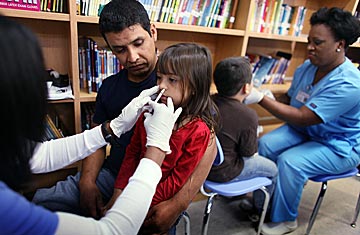
Two children are given the swine flu vaccination in Miami, Florida.
One shot of 2009 H1N1 vaccine, instead of two, may generate a sufficient antibody response against the virus in children ages six months to nine years, researchers report.
Under current government recommendations, young children receive two doses of the vaccine, while adults get only one. The two-shot regimen for youngsters is based on a similar recommendation in this population for seasonal flu vaccination. Because their immune systems are still developing, and because they are less likely to harbor existing antibodies from previous bouts with the flu, children are less able to generate protective antibodies against the influenza virus than adults, requiring two doses of the shot.
Since the pandemic began last spring, children have been the hardest hit by H1N1. So far, youngsters have the highest infection, hospitalization and death rates from the pandemic influenza than any other age group, and health officials have targeted those between six months and 24 years old as a priority group for vaccination.
The latest study of an Australian H1N1 vaccine, a shot that is also distributed in the U.S., shows that a single dose containing the same amount of viral protein as two doses combined, can produce enough flu-fighting antibodies in nearly 93% of youngsters immunized. "The single-dose response is substantially better than responses to seasonal flu vaccines of past years," says Terry Nolan of the University of Melbourne, the lead author of the study. That's good news for parents and public health officials, particularly in light of the fact that about half of U.S. children never get their second dose of seasonal flu vaccine.
In the study, which involved 370 healthy children ages six months to nine years in Australia, researchers immunized half of the group with two doses of vaccine, each containing 15 micrograms (mcg) of the virus antigen. The other half received two doses containing 30 mcg of the antigen each. In both cases, the second dose was given 21 days after the first. The researchers found that 21 days after receiving only one shot, 92.5% of children in the 15-mcg-dose group and 98% of those receiving the higher dose had generated sufficient antibodies against H1N1.
The results suggest that one shot of the lower-dose vaccine may generate just as many flu antibodies as the two shots U.S. children currently receive, each containing 7.5 mcg of viral antigen. The findings could factor into discussions that health officials have as they make up recommendations for next year's flu season. Having children get immunized only once, rather than twice, may help increase the percentage of kids who are protected against influenza.
But until then, neither Nolan nor officials at the Centers for Disease Control and Prevention (CDC) are ready to ditch the second dose. For one thing, they note, the level of antibodies does not always translate to actual protection against the flu. "Lab studies are a proxy and work well," says Dr. Anthony Fiore, at the CDC's National Center for Infectious Diseases, who wrote an editorial accompanying the study in the Journal of the American Medical Association. "But until you can show that a single dose is as effective as two, it's probably too soon to pull away from the two-dose recommendation."
Such data will be available only after the flu season ends next spring, at which point researchers can study hospital records of children who were treated for H1N1 infection. Only then can they compare those who received both doses of the vaccine to those who missed their second shot, and see if one or the other group was more likely to come down with the flu.
Another reason to be cautious about the Australian data, says Fiore, is that the youngsters in the study were all healthy, with normal immune systems. But those who are most vulnerable to influenza are children with underlying conditions such as asthma or diabetes, who may need the added boost from a second dose to protect them from complications of the flu. He notes also that previous studies of other H1N1 vaccines showed slightly weaker antibody responses in children after a single dose than the Australian shot, which suggests one dose may not be enough to effectively combat influenza in youngsters.
